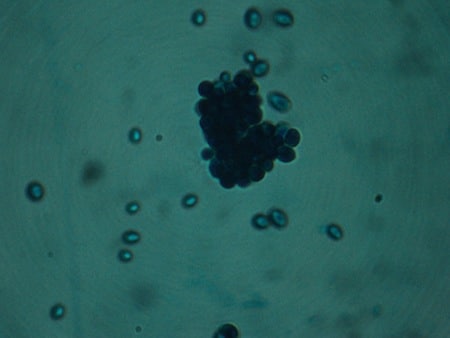 Evolution
Evolution
More Darwinian Degradation: Much Ado about Yeast

Recently a paper by Ratcliff et al. (2012) entitled “Experimental evolution of mulitcellularity” appeared and received a fair amount of press attention, including a story in the New York Times. The authors discuss their results in terms of the origin of multicellularity on earth.
The senior author of the paper is Michael Travisano of the University of Minnesota, who was a student of Richard Lenski’s in the 1990s. The paper, published in PNAS, was edited by Lenski. The gist is as follows.
The authors repeated three steps multiple times: 1) they grew single-celled yeast in a flask; 2) briefly centrifuged it; and 3) took a small amount from the bottom of the flask to seed a new culture. This selected for cells that sedimented faster than most. After a number of rounds of selection the cells sedimented much faster than the beginning cells. Examination showed that the fast-sedimenting cells formed clusters due to incomplete separation of replicating mother-daughter cells.
The cell clusters also were 10% less fit (that’s quite an amount) than the beginning cells in the absence of the sedimentation selection. After further selection it was seen that some cells in clusters would “commit suicide” (apoptosis), which apparently made the clusters more brittle and allowed chunks to break off and form new clusters. (The beginning cells already had the ability to undergo apoptosis.)
It seems to me that Richard Lenski, who knows how to get the most publicity out of exceedingly modest laboratory results, has taught his student well. In fact, the results can be regarded as the loss of two pre-existing abilities: 1) the loss of the ability to separate from the mother cell during cell division; and 2) the loss of control of apoptosis.
The authors did not analyze the genetic changes that occurred in the cells, but I strongly suspect that if and when they do, they’ll discover that functioning genes or regulatory regions were broken or degraded. This would be just one more example of evolution by loss of pre-existing systems, at which we already knew that Darwinian processes excel. The apparently insurmountable problem for Darwinism is to build new systems.
Literature Cited
Ratcliff, W. C., R. F. Denison, M. Borrello, and M. Travisano, 2012 Experimental evolution of multicellularity. Proc. Natl. Acad. Sci. USA doi/10.1073/pnas.1115323109
